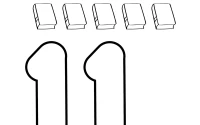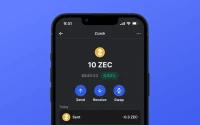Something is happening in the digital world. You can feel it, can't you? It’s not just in the dizzying climb of a chart on a screen, though the numbers are certainly breathtaking. No, this is something deeper. For years, we’ve watched the wild, untamed frontier of cryptocurrency become increasingly… domesticated. Paved over with corporate logos and regulatory frameworks. But the recent, explosive resurgence of Zcash (ZEC) feels like the frontier pushing back. It’s a signal that the original, radical promise of crypto—the promise of genuine financial privacy—isn’t dead. It was just sleeping.
When I first saw the news about the Samourai Wallet developer, Keonne Rodriguez, receiving the maximum possible sentence, I felt a genuine chill. It was a stark reminder of the forces that want to turn this revolutionary technology into just another transparent, controllable appendage of the old system. And then, almost immediately, I watched the Zcash price begin its meteoric ascent, a 16-fold rally that liquidated over $50 million in short positions from traders who bet against privacy. It was as if the market itself was issuing a defiant roar. This isn’t just a random pump. This is a movement. It's a declaration that for many of us, a transparent, centralized blockchain is a bug, not a feature.
We’re now seeing titans of the industry like Arthur Hayes of BitMEX rebalancing their entire strategy, a move highlighted by reports that Arthur Hayes Puts Zcash Right Behind Bitcoin in His Portfolio. Why? Because they see what's coming. They understand that as the traditional financial world wraps its tentacles around Bitcoin, the need for a true digital alternative—one that respects the sanctity of a private transaction—becomes not just a niche desire, but an absolute necessity. Is this the moment we stop asking for permission to build a private future and simply start building it?
The Fusion Reaction We've Been Waiting For
For over seven years, Zcash has been the gold standard of privacy, built on the elegant and almost magical mathematics of zero-knowledge proofs. But let’s be honest, for a long time, it existed on an island. Using it felt important, but it was disconnected from the vibrant, high-speed world of decentralized finance (DeFi) that was erupting on chains like Ethereum and, more recently, Solana. Privacy was a trade-off. You could have security, or you could have speed and utility. You couldn't have both.

Until now.
The arrival of zenZEC on Solana is the breakthrough that changes the entire equation. This is the moment privacy got a jet engine. Zenrock, the team behind this, has engineered something truly brilliant with their decentralized multi-party computation (MPC) network. Now, that sounds complex, so let me break it down. It uses what's called multi-party computation—in simpler terms, it means the private key that secures the assets never exists in one place. Imagine a master key to a vault, but instead of one physical key, it's magically split into a hundred shards of light held by a hundred different guardians. No single guardian has the key, but together, they can open the door without ever reassembling it. That’s the elegance of this system. It removes the single point of failure that has plagued so many other cross-chain solutions.
What this means for you, for me, for all of us, is that you get the Fort Knox-level privacy that Zcash is famous for but at the speed of a fiber-optic network, suddenly privacy isn't a slow, clunky trade-off, it’s an integrated, instantaneous feature of a financial system we're building right now. We're seeing the first tremors of a massive earthquake, with reports like Zcash Privacy Meets Solana DeFi with Zenrock’s Wrapped ZEC Crossing $15M in Volume showing significant early adoption on exchanges like Orca. For the first time, Zcash holders can use their assets as collateral, earn yield, and participate in DeFi without broadcasting their entire financial history to the world.
This isn't just an upgrade; it's a paradigm shift. This is like the moment we went from dial-up modems to broadband internet. The underlying principle was the same—connecting to a network—but the experience, the potential, the sheer scale of what became possible, changed everything. We have to ask ourselves: what new financial tools, what new forms of organization, become possible when privacy is not only protected, but is also seamless and fast? Of course, with this power comes a profound responsibility to build systems that are resilient, fair, and resist the darker impulses that anonymity can sometimes enable. That's our challenge to solve.
The Soul of Crypto is Waking Up
Let's be perfectly clear. The story here isn't a price chart. It's not about short squeezes or portfolio allocations. Those are just the aftershocks. The real event, the tectonic plate that is shifting beneath our feet, is the rediscovery of crypto's core purpose. For a while, it seemed like we were collectively willing to trade the soul of this revolution for mainstream acceptance and institutional dollars. What we're witnessing with Zcash is the powerful, undeniable return of that soul. It's a reminder that the goal was never just to create a new asset class for Wall Street. The goal was to build a better, more equitable, and fundamentally more private foundation for human interaction and commerce. And now, finally, we have the tools to build it at scale. The dream is alive.










